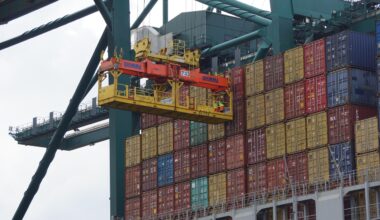International Diversification and Portfolio Performance
International investing has increasingly become an essential strategy for optimizing portfolio performance. This practice allows investors to spread risk across various markets, reducing exposure to domestic economic fluctuations. Achieving effective diversification internationally requires careful selection of assets, weighing factors like currency risk, geopolitical stability, and the economic conditions of target countries. Investors must analyze correlations between domestic and foreign markets, as different economies react differently to global events. A well-diversified portfolio can potentially enhance returns by capturing growth in emerging markets, which often grow at a faster pace than developed ones. For instance, an investor may choose to allocate funds in developing regions, such as Southeast Asia or Africa, thereby tapping into rapidly expanding economies. It’s critical, however, to ensure that this diversification doesn’t lead to overexposure to any singular foreign market. A balanced approach entails investing in multiple countries and regions, distributing the weight of investments to mitigate risks. Understanding these nuances is vital for any investor who aims to leverage international diversification as a core component of their investment strategy.
One primary advantage of investing internationally is the potential for enhanced returns. By diversifying beyond borders, investors can opportunistically tap into different growth cycles and technological advancements that may not be available domestically. For example, the tech sector in Asia has experienced phenomenal growth, often outpacing traditional markets in returns. In addition to sectors, geographical diversity can also buffer against local downturns. Suppose the domestic market faces stagnation; in that case, an internationally diversified portfolio might have exposure to countries or regions that are thriving economically. Moreover, rational allocation in foreign assets typically acts as a hedge against inflation, especially if the foreign currencies strengthen relative to the investor’s home currency. Nevertheless, international investment does come with potential pitfalls, such as currency fluctuations, which can impact the overall gains or losses. As such, investors must remain informed about foreign market conditions, currency trends, and regulatory changes that impact profitability. A thorough understanding of these variables can lead to making more informed decisions regarding international investments, contributing positively to their overall portfolio performance.
The Role of Currency in International Investing
Currency fluctuations play a pivotal role in international investing. Investors must account for exchange rates when investing in foreign assets, as changes can significantly affect returns. For instance, if an investor purchases stocks in a foreign market, they not only need to monitor the asset’s performance but also the strength of the foreign currency against their home currency. A depreciation of the foreign currency can offset gains from the investment, translating into lower returns once converted back to the home currency. Conversely, if the foreign currency appreciates, returns can be amplified. Hence, effective currency management can be a vital component of an international investment strategy. Strategies to mitigate currency risk include hedging through options or futures contracts or diversifying across multiple currencies. Moreover, investors can utilize currency ETFs or mutual funds that allow for exposure to a basket of foreign currencies. Understanding how economic indicators, political stability, and market sentiment can affect currencies will aid investors in making better investment decisions and translating currency movements into actionable investment strategies.
Moreover, understanding the market structure of foreign investments can enhance overall portfolio performance. Each market has its peculiarities, influenced by local traditions, regulatory frameworks, and consumer behavior. Investors must conduct thorough due diligence on international stocks or assets to gauge their long-term viability. Local economic indicators such as GDP growth, inflation rates, and employment statistics are crucial in this analytical process. Furthermore, sector-specific trends are also important to consider since certain industries may perform better in specific regions due to cultural or economic factors. For example, technological advancements may thrive in one country, while natural resource extraction might be more profitable in another. Additionally, geopolitical issues can influence market sentiment and affect liquidity. Therefore, a robust international investing strategy incorporates sound research and knowledge of local markets. By staying informed and proactive about international developments, investors can strategically capitalize on emerging trends that benefit their portfolios. This diligent approach can help navigate the complexities of international investments while optimizing overall financial performance.
Evaluating International Market Risks
With international investing comes an array of unique risks that require careful evaluation. Political instability, for instance, can significantly impact investor confidence and market performance. Investors must analyze the political landscape before committing funds abroad. Markets in emerging economies offer potential for growth but may also present higher political and economic risks. Additionally, local regulations regarding capital flow, taxation, and property rights can vary significantly, influencing the returns of international investments. Environmental risks and natural disasters can also have sudden effects on market performance. Hence, conducting a holistic risk assessment of the target country is vital. Effective international portfolios often include risk management practices such as diversification across sectors and geographical boundaries. Furthermore, investors may consider allocating a portion of their portfolio into liquid assets to provide flexibility in times of market volatility. By understanding the diverse risk factors at play, investors can position themselves to make informed decisions that protect their investments. It is essential to stay vigilant and continuously assess the evolving international landscape to adapt strategies accordingly and ensure sustained portfolio performance.
As investors look toward international investments, understanding market trends and economic forecast patterns is critical. Reports that highlight emerging markets with high potential can significantly influence investment decisions. Factors to consider include demographic shifts, urbanization trends, and technological adoption. Additionally, macroeconomic stability indicators, such as interest rates and inflation trends, can provide insight into market health. Opportunities can also arise from trade agreements and partnerships among countries that enhance cross-border economic activities and create investment avenues. Furthermore, sustainable investing themes, such as renewable energy and responsible governance, can impact which overseas opportunities are deemed where growth will excel. Being attuned to governmental policies regarding trade, tariffs, and market access can present either challenges or favorable conditions for international ventures. Engaging with local investment professionals or companies that understand regional dynamics can provide invaluable insights into navigating the complexity of foreign investments. Ultimately, an informed investor can leverage these trends to capitalize on the right opportunities, strategically curating an international portfolio that promises robust returns and mitigated risks over time.
Conclusion: The Value of International Diversification
In conclusion, the value of international diversification cannot be overstated when it comes to enhancing portfolio performance. By strategically spreading investments across different economies, sectors, and currencies, investors can mitigate risks tied to local market performance. This ensures that they capture growth opportunities around the world, maintaining a balanced exposure that is beneficial over time. As global markets continue to evolve, remaining adaptable and informed is essential for successful international investing. Opportunities often lie in less-observed markets, making it worthwhile for investors to think beyond familiar territories. The increasing interconnectedness of global economies means that certain trends may impact multiple regions simultaneously, underscoring the importance of a well-researched investment strategy. Utilizing tools and resources available for international analysis, like economic reports and market studies, can greatly assist in building an effective strategy that aligns with individual financial goals. Thus, investors who prioritize international diversification will likely find a wealth of opportunities to enhance financial growth and resilience in their portfolios.
With proper planning and execution, international investing can lead to incredible diversification benefits. Having a global portfolio positions investors to capitalize on growth potential while diversifying their overall risk profile. With today’s technology, the barriers to investing internationally have diminished significantly, allowing greater access and insights into foreign markets. Embracing this trend will be crucial as globalization continues to shape investing practices. The potential gains from foreign investment not only lie in financial returns but in gaining exposure to innovative companies and industries that can lead the charge in the future economy. Careful monitoring of both domestic and international economies will help investors make timely decisions that optimize their portfolio potential. As more people recognize the importance of international diversification, staying informed, leveraging expert insights, and remaining adaptable will be key strategies for enduring success in an unpredictable investment landscape. To achieve the financial goals importantly, investors should also consider consulting financial advisors specializing in international investing to ensure a well-rounded approach.





